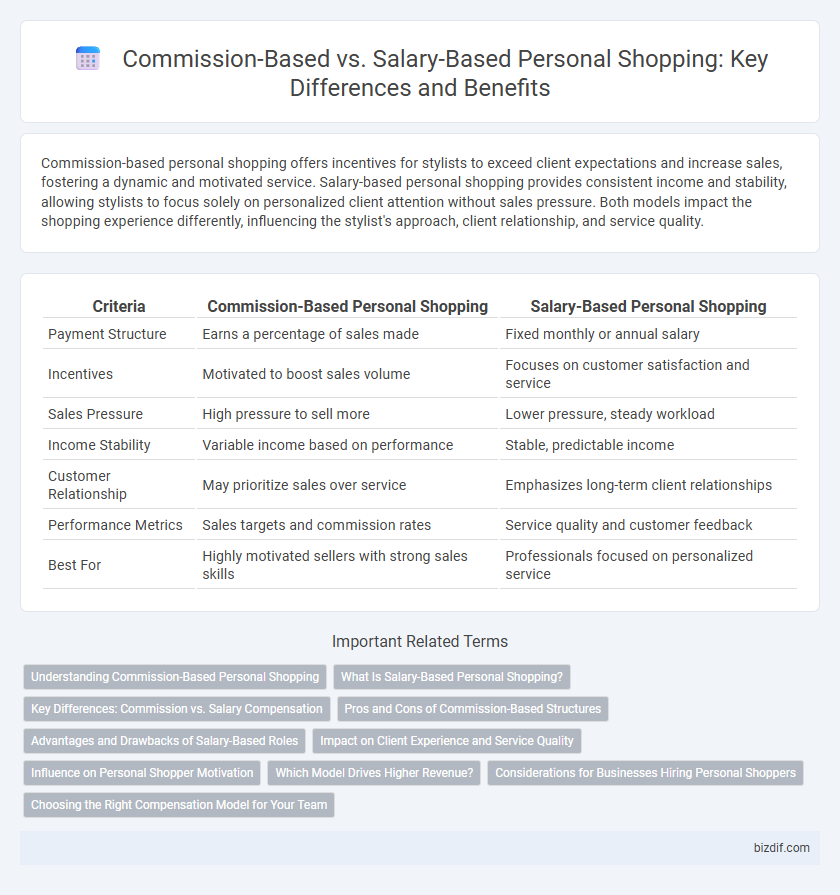Commission-based personal shopping offers incentives for stylists to exceed client expectations and increase sales, fostering a dynamic and motivated service. Salary-based personal shopping provides consistent income and stability, allowing stylists to focus solely on personalized client attention without sales pressure. Both models impact the shopping experience differently, influencing the stylist's approach, client relationship, and service quality.
Table of Comparison
| Criteria | Commission-Based Personal Shopping | Salary-Based Personal Shopping |
|---|---|---|
| Payment Structure | Earns a percentage of sales made | Fixed monthly or annual salary |
| Incentives | Motivated to boost sales volume | Focuses on customer satisfaction and service |
| Sales Pressure | High pressure to sell more | Lower pressure, steady workload |
| Income Stability | Variable income based on performance | Stable, predictable income |
| Customer Relationship | May prioritize sales over service | Emphasizes long-term client relationships |
| Performance Metrics | Sales targets and commission rates | Service quality and customer feedback |
| Best For | Highly motivated sellers with strong sales skills | Professionals focused on personalized service |
Understanding Commission-Based Personal Shopping
Commission-based personal shopping incentivizes shoppers to enhance sales by earning a percentage of the transaction value, directly linking their income to performance and customer satisfaction. This model encourages personalized service and expert product recommendations to boost client purchases, aligning the shopper's goals with business profitability. Understanding the impact of commission structures on motivation and sales strategy is crucial for optimizing personal shopping experiences and revenue outcomes.
What Is Salary-Based Personal Shopping?
Salary-based personal shopping involves receiving a fixed, regular income regardless of the number or value of purchases made for clients, ensuring consistent earnings and stability. This compensation model prioritizes personalized service and client satisfaction over transactional volume, allowing shoppers to focus on curated experiences without sales pressure. It contrasts with commission-based shopping by eliminating income variability, providing financial predictability and fostering long-term client relationships.
Key Differences: Commission vs. Salary Compensation
Commission-based personal shopping compensates shoppers with a percentage of sales they generate, directly incentivizing higher performance and personalized recommendations to increase purchases. Salary-based personal shoppers receive a fixed income regardless of sales volume, providing financial stability and consistent earnings without pressure to upsell. The choice between commission and salary compensation impacts motivation, client interaction, and risk tolerance for personal shoppers.
Pros and Cons of Commission-Based Structures
Commission-based personal shopping incentivizes agents with performance-driven earnings, leading to higher motivation and potentially greater customer satisfaction. However, this structure may result in inconsistent income and pressure to prioritize sales over client needs, risking trust and long-term loyalty. Understanding these trade-offs helps both shoppers and clients choose the most suitable compensation model for their goals.
Advantages and Drawbacks of Salary-Based Roles
Salary-based personal shopping provides consistent income stability, allowing shoppers to focus on client satisfaction without pressure to meet sales targets. This structure fosters long-term relationships as shoppers can prioritize personalized service over volume, enhancing customer loyalty. However, lack of commission may reduce motivation for upselling, potentially limiting earning potential compared to commission-based roles.
Impact on Client Experience and Service Quality
Commission-based personal shopping often motivates shoppers to prioritize clients' preferences and spending habits, potentially enhancing personalized recommendations and attentiveness. Salary-based personal shopping provides more consistent service quality by reducing pressure to upsell, fostering trust and long-term client relationships. Clients may experience greater satisfaction with commission-based models when seeking trend-driven, customized selections, while salary-based models emphasize reliability and unbiased advice.
Influence on Personal Shopper Motivation
Commission-based personal shopping significantly boosts motivation by directly linking earnings to sales performance, encouraging personal shoppers to actively seek high-value clients and upsell products. Salary-based personal shopping offers stable income, which can reduce stress but may result in less incentive to exceed basic responsibilities or drive additional sales. Personal shoppers on commission often exhibit higher enthusiasm and proactive customer engagement due to the financial rewards tied to their sales success.
Which Model Drives Higher Revenue?
Commission-based personal shopping incentivizes sales representatives to maximize client purchases, directly linking their earnings to revenue generation and often resulting in higher overall sales. Salary-based personal shopping provides consistent income but may lack the direct motivation to upsell or increase transaction value, potentially leading to lower revenue outcomes. Retailers seeking to boost revenue typically favor the commission model due to its performance-driven nature and alignment with sales goals.
Considerations for Businesses Hiring Personal Shoppers
Businesses hiring personal shoppers must evaluate compensation models carefully, balancing commission-based pay that incentivizes sales performance against salary-based structures that offer stability and consistent service quality. Commission schemes can drive motivation and align personal shopper goals with business revenue, but may risk aggressive selling or inconsistent client experience. Salary-based arrangements ensure predictable costs and foster long-term client relationships, making them suitable for brands prioritizing customer loyalty and service excellence.
Choosing the Right Compensation Model for Your Team
Commission-based personal shopping incentivizes staff by directly linking earnings to sales performance, fostering motivation and potentially higher revenue. Salary-based personal shopping offers stability and consistency, attracting experienced professionals who prioritize steady income over fluctuating commissions. Selecting the appropriate model depends on your business goals, budget constraints, and the desired balance between motivation and predictability in compensation.
Commission-based personal shopping vs Salary-based personal shopping Infographic

 bizdif.com
bizdif.com